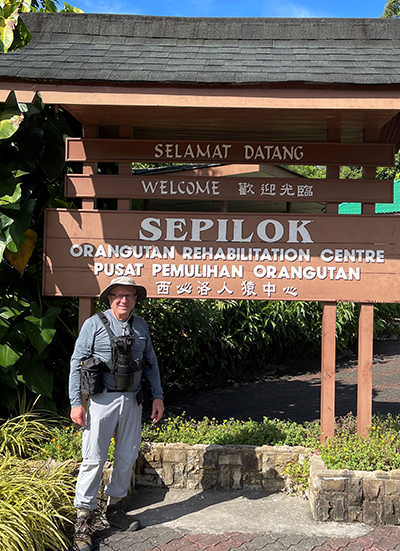
2022 alumnus Radford Bean (tourism, recreation and adventure leadership, outdoor recreation management option) traveled to Malaysian Borneo as part of our faculty-led program, Oil Palms and Orangutans: Forest Conservation in Malaysian Borneo. Radford sent the following reflection to us as part of our “What I did this summer” series – thank you Radford!
I spent much of June on Borneo looking at the impact deforestation, especially related to oil palm plantations, was having on the environment and ecosystem of Borneo. The group, led by Dr. Matt Betts, explored different landscape practices related to logging that will improve sustainability of the environment, economy, and the community. We learned of the sustainability practices one of the largest palm oil producers were taking to protect the environment.
Part of the sustainability practices we explored included looking at tourism activities that benefit communities on Borneo by helping to find sustainable tourism activities that improve the economy and lives of local communities. Tourism can play a major role in the improvement of communities if done sustainably and with involvement of people in the local community like we witnessed at KOPEL, a village-based co-operative focusing on ecotourism.
The Kinabatangan River, the largest river on Borneo, is heavily polluted with tons of plastic waste. All the plastic waste has to go someplace, and most of it will find its way to the ocean, where it will pose harm to the marine life. The sad thing is that the river supports a broad range of life. I observed macaques and endangered proboscis monkeys, water monitor lizards, saltwater crocodiles, herons, hornbills, and other wildlife relying on the river. The people also rely on the river as a source of food and drinking water.
Borneo is not a wealthy country, and the energy and water infrastructure are in serious need of modernization. I needed to drink bottled water because of a lack of adequate purification infrastructure.
Weaknesses in infrastructure aside, the island and its wildlife and people are amazing. I had some awesome wildlife photography opportunities, and my wildlife photography improved under the guidance of Dr. Mark Needham. The people were so friendly. Locals wanted photographs with me and others in my group.
It was an amazing experience, and I am grateful to have had the opportunity to participate in the trip. The trip allowed me to create a PowerPoint presentation I hope to deliver to local communities to inform them about the need to make wise consumer choices when it comes to purchasing products containing palm oil and its derivatives.
What I did this summer is a profile series of students, faculty and staff in the College of Forestry. Did you have a great job, vacation, or field research experience? Contact CoFThisWeek@oregonstate.edu and we will be in touch!

